新概念第二册Lesson 70 Red for danger讲义
文档属性
| 名称 | 新概念第二册Lesson 70 Red for danger讲义 | 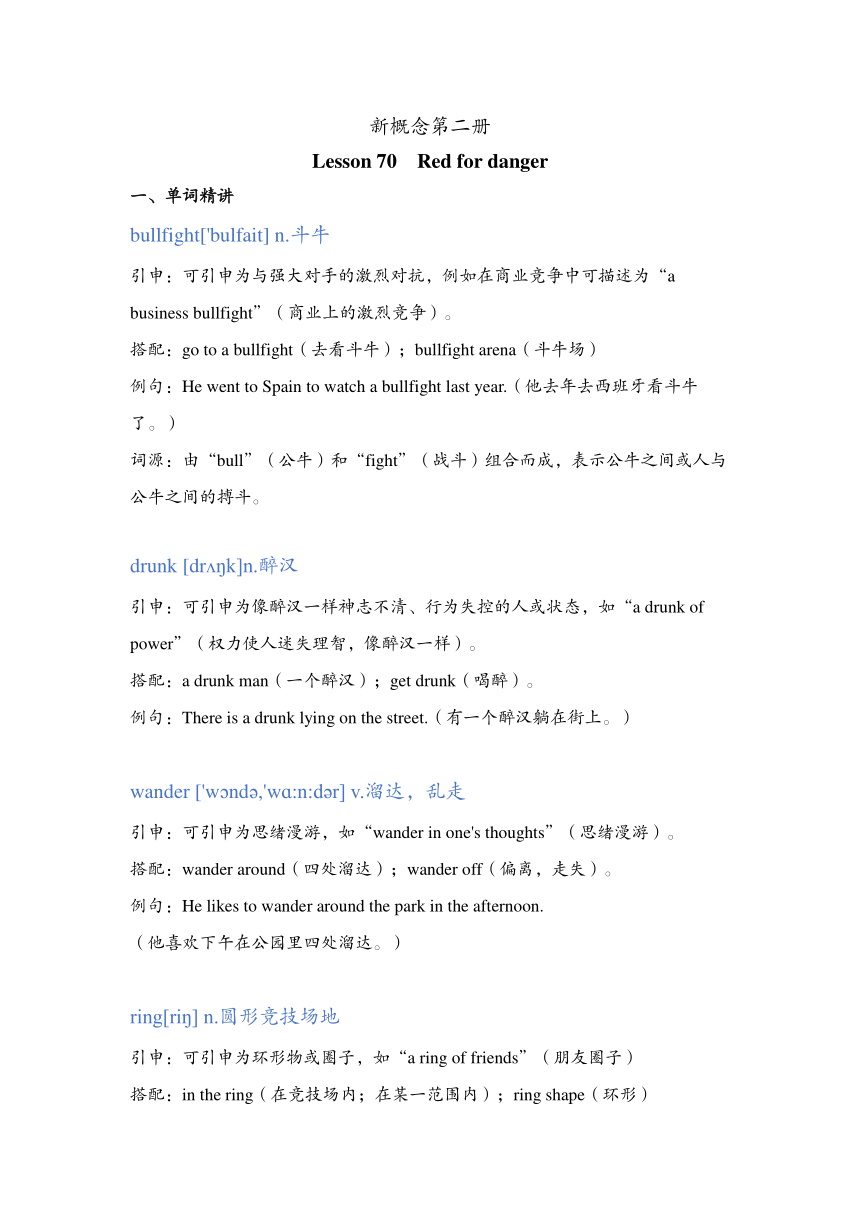 | |
| 格式 | docx | ||
| 文件大小 | 158.4KB | ||
| 资源类型 | 教案 | ||
| 版本资源 | 新概念英语 | ||
| 科目 | 英语 | ||
| 更新时间 | 2024-11-24 21:24:02 | ||
图片预览

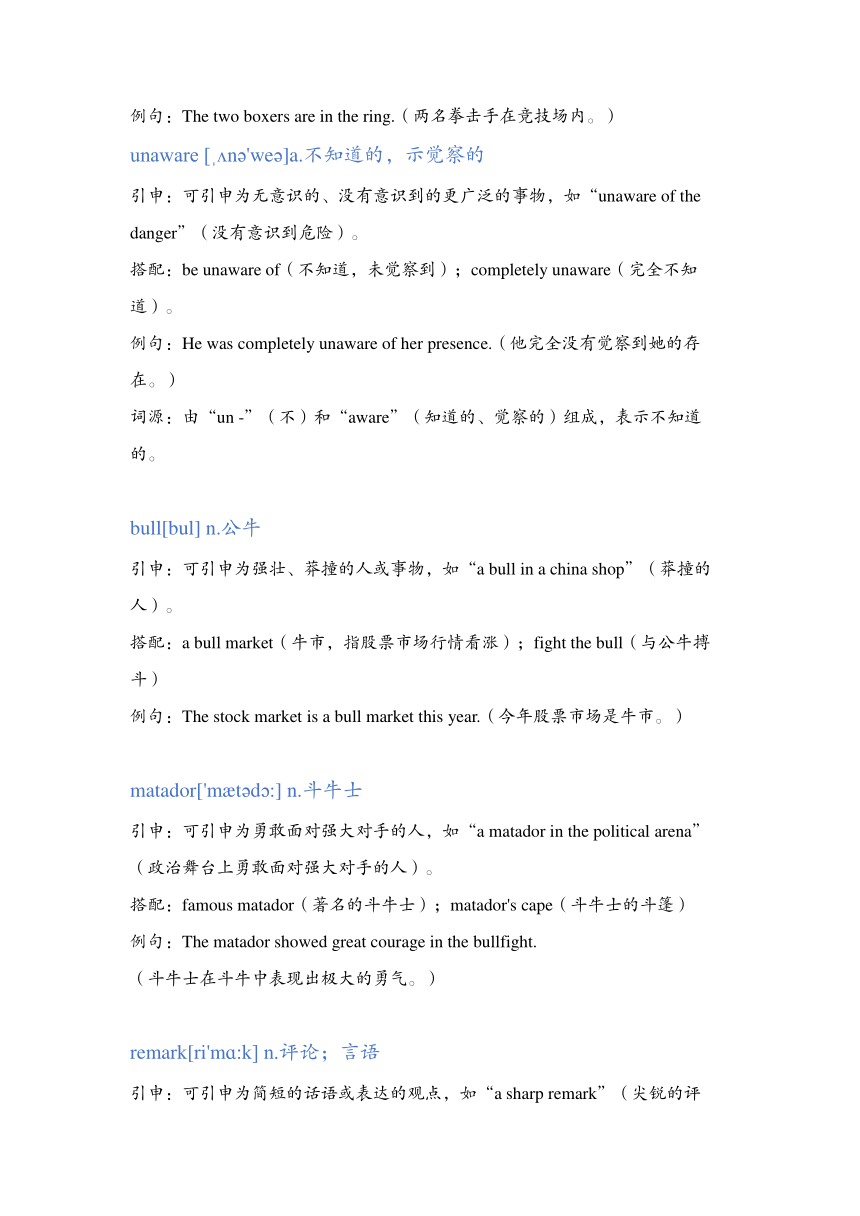
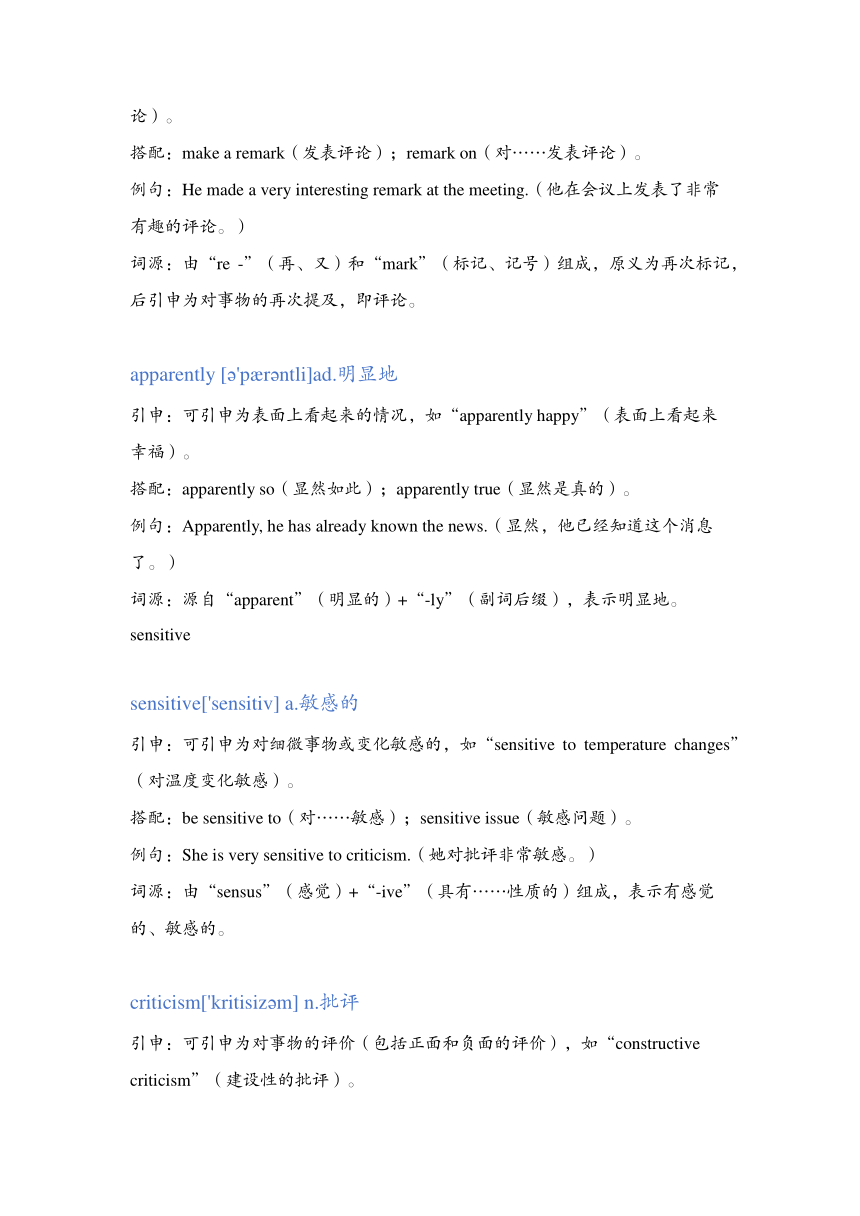
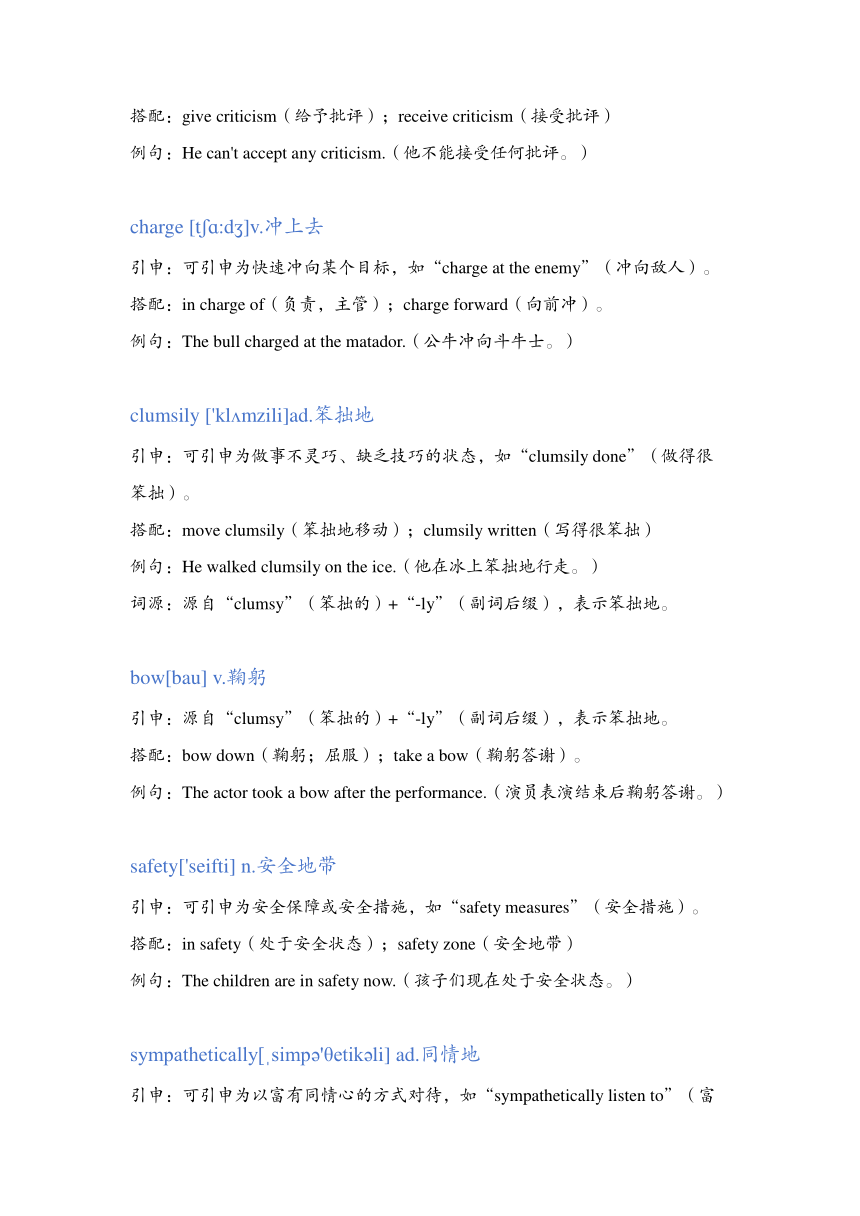
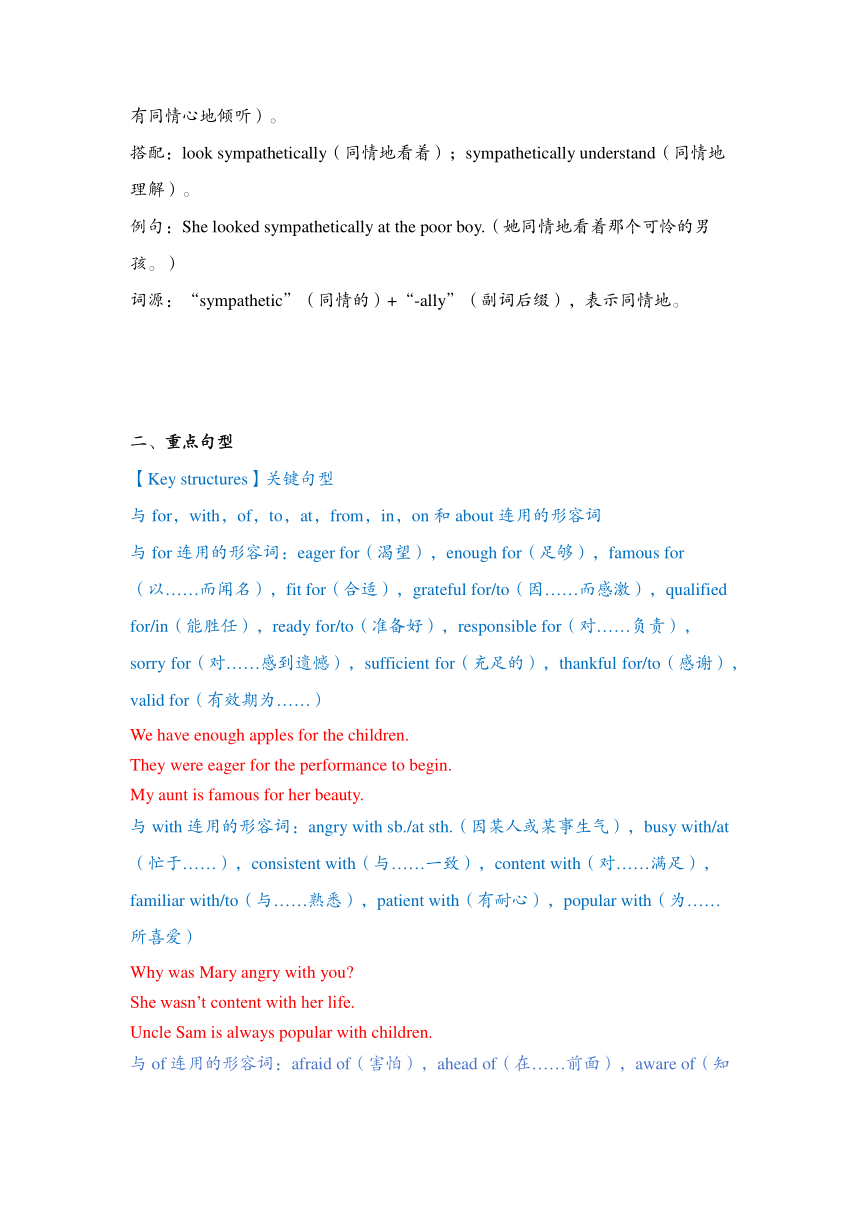
文档简介
新概念第二册
Lesson 70 Red for danger
单词精讲
bullfight['bulfait] n.斗牛
引申:可引申为与强大对手的激烈对抗,例如在商业竞争中可描述为“a business bullfight”(商业上的激烈竞争)。
搭配:go to a bullfight(去看斗牛);bullfight arena(斗牛场)
例句:He went to Spain to watch a bullfight last year.(他去年去西班牙看斗牛了。)
词源:由“bull”(公牛)和“fight”(战斗)组合而成,表示公牛之间或人与公牛之间的搏斗。
drunk [dr k]n.醉汉
引申:可引申为像醉汉一样神志不清、行为失控的人或状态,如“a drunk of power”(权力使人迷失理智,像醉汉一样)。
搭配:a drunk man(一个醉汉);get drunk(喝醉)。
例句:There is a drunk lying on the street.(有一个醉汉躺在街上。)
wander ['w nd ,'wɑ:n:d r] v.溜达,乱走
引申:可引申为思绪漫游,如“wander in one's thoughts”(思绪漫游)。
搭配:wander around(四处溜达);wander off(偏离,走失)。
例句:He likes to wander around the park in the afternoon.
(他喜欢下午在公园里四处溜达。)
ring[ri ] n.圆形竞技场地
引申:可引申为环形物或圈子,如“a ring of friends”(朋友圈子)
搭配:in the ring(在竞技场内;在某一范围内);ring shape(环形)
例句:The two boxers are in the ring.(两名拳击手在竞技场内。)
unaware [ n 'we ]a.不知道的,示觉察的
引申:可引申为无意识的、没有意识到的更广泛的事物,如“unaware of the danger”(没有意识到危险)。
搭配:be unaware of(不知道,未觉察到);completely unaware(完全不知道)。
例句:He was completely unaware of her presence.(他完全没有觉察到她的存在。)
词源:由“un -”(不)和“aware”(知道的、觉察的)组成,表示不知道的。
bull[bul] n.公牛
引申:可引申为强壮、莽撞的人或事物,如“a bull in a china shop”(莽撞的人)。
搭配:a bull market(牛市,指股票市场行情看涨);fight the bull(与公牛搏斗)
例句:The stock market is a bull market this year.(今年股票市场是牛市。)
matador['m t d :] n.斗牛士
引申:可引申为勇敢面对强大对手的人,如“a matador in the political arena”(政治舞台上勇敢面对强大对手的人)。
搭配:famous matador(著名的斗牛士);matador's cape(斗牛士的斗篷)
例句:The matador showed great courage in the bullfight.
(斗牛士在斗牛中表现出极大的勇气。)
remark[ri'mɑ:k] n.评论;言语
引申:可引申为简短的话语或表达的观点,如“a sharp remark”(尖锐的评论)。
搭配:make a remark(发表评论);remark on(对……发表评论)。
例句:He made a very interesting remark at the meeting.(他在会议上发表了非常有趣的评论。)
词源:由“re -”(再、又)和“mark”(标记、记号)组成,原义为再次标记,后引申为对事物的再次提及,即评论。
apparently [ 'p r ntli]ad.明显地
引申:可引申为表面上看起来的情况,如“apparently happy”(表面上看起来幸福)。
搭配:apparently so(显然如此);apparently true(显然是真的)。
例句:Apparently, he has already known the news.(显然,他已经知道这个消息了。)
词源:源自“apparent”(明显的)+“-ly”(副词后缀),表示明显地。
sensitive
sensitive['sensitiv] a.敏感的
引申:可引申为对细微事物或变化敏感的,如“sensitive to temperature changes”(对温度变化敏感)。
搭配:be sensitive to(对……敏感);sensitive issue(敏感问题)。
例句:She is very sensitive to criticism.(她对批评非常敏感。)
词源:由“sensus”(感觉)+“-ive”(具有……性质的)组成,表示有感觉的、敏感的。
criticism['kritisiz m] n.批评
引申:可引申为对事物的评价(包括正面和负面的评价),如“constructive criticism”(建设性的批评)。
搭配:give criticism(给予批评);receive criticism(接受批评)
例句:He can't accept any criticism.(他不能接受任何批评。)
charge [t ɑ:d ]v.冲上去
引申:可引申为快速冲向某个目标,如“charge at the enemy”(冲向敌人)。
搭配:in charge of(负责,主管);charge forward(向前冲)。
例句:The bull charged at the matador.(公牛冲向斗牛士。)
clumsily ['kl mzili]ad.笨拙地
引申:可引申为做事不灵巧、缺乏技巧的状态,如“clumsily done”(做得很笨拙)。
搭配:move clumsily(笨拙地移动);clumsily written(写得很笨拙)
例句:He walked clumsily on the ice.(他在冰上笨拙地行走。)
词源:源自“clumsy”(笨拙的)+“-ly”(副词后缀),表示笨拙地。
bow[bau] v.鞠躬
引申:源自“clumsy”(笨拙的)+“-ly”(副词后缀),表示笨拙地。
搭配:bow down(鞠躬;屈服);take a bow(鞠躬答谢)。
例句:The actor took a bow after the performance.(演员表演结束后鞠躬答谢。)
safety['seifti] n.安全地带
引申:可引申为安全保障或安全措施,如“safety measures”(安全措施)。
搭配:in safety(处于安全状态);safety zone(安全地带)
例句:The children are in safety now.(孩子们现在处于安全状态。)
sympathetically[ simp 'θetik li] ad.同情地
引申:可引申为以富有同情心的方式对待,如“sympathetically listen to”(富有同情心地倾听)。
搭配:look sympathetically(同情地看着);sympathetically understand(同情地理解)。
例句:She looked sympathetically at the poor boy.(她同情地看着那个可怜的男孩。)
词源:“sympathetic”(同情的)+“-ally”(副词后缀),表示同情地。
重点句型
【Key structures】关键句型
与for,with,of,to,at,from,in,on和about连用的形容词
与for连用的形容词:eager for(渴望),enough for(足够),famous for(以……而闻名),fit for(合适),grateful for/to(因……而感激),qualified for/in(能胜任),ready for/to(准备好),responsible for(对……负责),sorry for(对……感到遗憾),sufficient for(充足的),thankful for/to(感谢),valid for(有效期为……)
We have enough apples for the children.
They were eager for the performance to begin.
My aunt is famous for her beauty.
与with连用的形容词:angry with sb./at sth.(因某人或某事生气),busy with/at(忙于……),consistent with(与……一致),content with(对……满足),familiar with/to(与……熟悉),patient with(有耐心),popular with(为……所喜爱)
Why was Mary angry with you
She wasn’t content with her life.
Uncle Sam is always popular with children.
与of连用的形容词:afraid of(害怕),ahead of(在……前面),aware of(知道),capable of(能够),careful of/with(小心),certain of(确信),conscious of(意识到),envious of(妒忌),fond of(爱好),guilty of(有……罪的),ignorant of(不了解),independent of(独立于),jealous of(妒忌),kind of/to(对……和蔼),north/south/east/west of(在……的北/南/东/西面),short of(缺乏),shy of(顾虑),sure of(肯定),worthy of(值得)
She is careful his coming. 她注意衣着。
I was short of money at that time.
与to连用的形容词:close to(接近于),contrary to(与……相反),cruel to(对……残忍),dear to(对……很重要),equal to(与……相等),faithful to(忠于……),fatal to(对……是致命的),harmful to(对……有害的),identical to(与……相同的),indifferent to(对……不关心),inferior to(劣于……),liable to(对……有义务的),new to(对……没有经验),obedient to(对……服从),obvious to(对……清楚的),polite to(对……有礼貌),previous to(先于),rude to(对……粗暴无礼),sensitive to(对……敏感),similar to(与……相似),useful to(对……有用)
Most people are sensitive to criticism.
Though the bicycle is old, it is very dear to me.
虽然这辆自行车破旧,但我很珍视它。
All these words are new to me. 所有这些单词我都是第一次遇到。
It’s obvious to everyone that he’s lying. 大家都清楚他在撒谎。
My car is similar to yours. 我的车与你的车相似。
与at连用的形容词:bad at(不善于……),clever at(擅长),efficient at(能胜任的),expert at/in(能熟练做……),good at(善于),indignant at(对……感到愤慨),quick at(很快),sad at/about(因……而悲伤),slow at(对……迟钝),skillful at/in(熟练)
I am good/bad at swimming.
Tom is quick/slow at learning new things.
与from连用的形容词:away from(距……远的),different from(与……不同的),far from(远离),safe from(无危险的)
The man was far from comfortable while being confined to the wooden box.
那人被闷在木箱里时一点儿也不舒服。
与in连用的形容词:deficient in(缺少),fortunate from(在……很幸运),honest from(对……很诚实),weak from(在……薄弱的)
You’re fortunate in having a house of your own.
Frank is honest in business.
I’m weak in/at chemics.
与on连用的形容词:dependent on(依赖于……),intent on(专心于……),keen on(热心于……)
She was keen on tennis.
You shouldn’t be so intent on making money.
Are you still dependent on your father
与about连用的形容词:curious about(对……好奇的),doubtful about/of(对……有疑问),enthusiastic about(对……热心),reluctant about/to(勉强),right about/in(在……是正确的),uneasy about(对……感到不安)
She is uneasy about her future. 她为自己的前途担心。
I’m doubtful about/of his words.
课文精讲
“During a bullfight, a drunk suddenly wandered into the middle of the ring.”
在一次斗牛时,一个醉汉突然溜达到斗牛场中间,人们开始大叫起来,但醉汉却没有意识到危险。
“During a bullfight”:在斗牛期间,“during”表示在……期间,“bullfight”是斗牛。
“a drunk”:一个醉汉,这里“drunk”作名词。
“wandered into”:溜达进,“wander”表示溜达、乱走,“into”表示进入。
“the middle of the ring”:圆形竞技场地的中间,“ring”指圆形竞技场地。
The crowd began to shout, but the drunk was unaware of the danger.
当时那公牛正忙于对付斗牛士,但突然它看见了醉汉,只见他正大声说着粗鲁的话,手里挥动着一顶红帽子。
be unaware of… 不知道,没有觉察……
“The crowd”:人群。
“began to shout”:开始大喊,“begin to do sth.”表示开始做某事。
“unaware of the danger”:没有意识到危险,“be unaware of”是固定搭配。
While she read the book, she was unaware of the noise around her.
I was unaware that you were coming. 我不知道你要来。
The bull was busy with the matador at the time, but it suddenly caught sight of the drunk who was shouting rude remarks and waving a red cap.
对挑衅显然非常敏感的公牛完全撇开斗牛士,直奔醉汉而来。
“was busy with”:忙于……,“busy”表示忙碌的。
“at the time”:当时。
“caught sight of”:看到,是“catch sight of”的过去式。
“rude remarks”:粗鲁的评论,“remark”表示评论。
“waving a red cap”:挥舞着一顶红帽子,“wave”表示挥舞。
As I came out of the shop, I caught sight of Dan in the crowd.
Apparently sensitive to criticism, the bull forgot all about the matador and charged at the drunk.”
“Apparently sensitive to criticism”:显然对批评很敏感,“Apparently”表示显然,“sensitive to”表示对……敏感。
“forgot all about”:完全忘记,“forget about”表示忘记。
“charged at”:冲向,“charge”表示冲上去。
be/feel sure of oneself 有自信心
She’s always so sure of herself.
“The crowd suddenly grew quiet. The drunk, however, seemed quite sure of himself.”观众突然静了下来,可这醉汉像是很有把握似的。
“grew quiet”:变得安静,“grow”表示变得,是系动词。
“seemed quite sure of himself”:看起来对自己很有把握,“seem”表示似乎、看起来,“be sure of oneself”表示对自己有把握。
“When the bull got close to him, he clumsily stepped aside to let it pass.”
当公牛逼近他时,他踉跄地住旁边一闪,牛扑空了。
“got close to”:靠近,“get close to”表示接近。
“clumsily stepped aside”:笨拙地走到一边,“clumsily”是副词,修饰“stepped”,“step aside”表示走到一边。
“let it pass”:让它过去,“let”表示让,“pass”表示通过。
“The crowd broke into cheers and the drunk bowed.”
观众欢呼起来,醉汉向人们鞠躬致谢。
“broke into cheers”:爆发出欢呼声,“break into”表示突然开始(做某事)。
“bowed”:鞠躬,是“bow”的过去式。
“By this time, however, three men had come into the ring and they quickly dragged the drunk to safety.”
然而,此时已有3个人进入斗牛场,迅速把醉汉拉到安全的地方。
“By this time”:到这个时候。
“had come into”:已经进入,是“come into”的过去完成时形式。
“dragged the drunk to safety”:把醉汉拖到安全地带,“drag”表示拖、拽。
Even the bull seemed to feel sorry for him, for it looked on sympathetically until the drunk was out of the way before once more turning its attention to the matador.
好像连牛也在为他感到遗憾,因为它一直同情地看着醉汉,直到他的背影消逝,才重新将注意力转向斗牛士。
“seemed to feel sorry for”:似乎为……感到抱歉,“seem to do sth.”表示似乎做某事。
“looked on sympathetically”:同情地看着,“look on”表示观看,“sympathetically”是副词,修饰“look on”。
“was out of the way”:不碍事,离开。
“once more turning its attention to”:再次把注意力转向,“once more”表示再次。Many people just looked on while the two men robbed a woman.
out of the way 不碍事,不挡路
While making meat pies, I always order the children to keep out of the way.
在做肉馅饼时,总是命令孩子们不要碍事。
Lesson 70 Red for danger
单词精讲
bullfight['bulfait] n.斗牛
引申:可引申为与强大对手的激烈对抗,例如在商业竞争中可描述为“a business bullfight”(商业上的激烈竞争)。
搭配:go to a bullfight(去看斗牛);bullfight arena(斗牛场)
例句:He went to Spain to watch a bullfight last year.(他去年去西班牙看斗牛了。)
词源:由“bull”(公牛)和“fight”(战斗)组合而成,表示公牛之间或人与公牛之间的搏斗。
drunk [dr k]n.醉汉
引申:可引申为像醉汉一样神志不清、行为失控的人或状态,如“a drunk of power”(权力使人迷失理智,像醉汉一样)。
搭配:a drunk man(一个醉汉);get drunk(喝醉)。
例句:There is a drunk lying on the street.(有一个醉汉躺在街上。)
wander ['w nd ,'wɑ:n:d r] v.溜达,乱走
引申:可引申为思绪漫游,如“wander in one's thoughts”(思绪漫游)。
搭配:wander around(四处溜达);wander off(偏离,走失)。
例句:He likes to wander around the park in the afternoon.
(他喜欢下午在公园里四处溜达。)
ring[ri ] n.圆形竞技场地
引申:可引申为环形物或圈子,如“a ring of friends”(朋友圈子)
搭配:in the ring(在竞技场内;在某一范围内);ring shape(环形)
例句:The two boxers are in the ring.(两名拳击手在竞技场内。)
unaware [ n 'we ]a.不知道的,示觉察的
引申:可引申为无意识的、没有意识到的更广泛的事物,如“unaware of the danger”(没有意识到危险)。
搭配:be unaware of(不知道,未觉察到);completely unaware(完全不知道)。
例句:He was completely unaware of her presence.(他完全没有觉察到她的存在。)
词源:由“un -”(不)和“aware”(知道的、觉察的)组成,表示不知道的。
bull[bul] n.公牛
引申:可引申为强壮、莽撞的人或事物,如“a bull in a china shop”(莽撞的人)。
搭配:a bull market(牛市,指股票市场行情看涨);fight the bull(与公牛搏斗)
例句:The stock market is a bull market this year.(今年股票市场是牛市。)
matador['m t d :] n.斗牛士
引申:可引申为勇敢面对强大对手的人,如“a matador in the political arena”(政治舞台上勇敢面对强大对手的人)。
搭配:famous matador(著名的斗牛士);matador's cape(斗牛士的斗篷)
例句:The matador showed great courage in the bullfight.
(斗牛士在斗牛中表现出极大的勇气。)
remark[ri'mɑ:k] n.评论;言语
引申:可引申为简短的话语或表达的观点,如“a sharp remark”(尖锐的评论)。
搭配:make a remark(发表评论);remark on(对……发表评论)。
例句:He made a very interesting remark at the meeting.(他在会议上发表了非常有趣的评论。)
词源:由“re -”(再、又)和“mark”(标记、记号)组成,原义为再次标记,后引申为对事物的再次提及,即评论。
apparently [ 'p r ntli]ad.明显地
引申:可引申为表面上看起来的情况,如“apparently happy”(表面上看起来幸福)。
搭配:apparently so(显然如此);apparently true(显然是真的)。
例句:Apparently, he has already known the news.(显然,他已经知道这个消息了。)
词源:源自“apparent”(明显的)+“-ly”(副词后缀),表示明显地。
sensitive
sensitive['sensitiv] a.敏感的
引申:可引申为对细微事物或变化敏感的,如“sensitive to temperature changes”(对温度变化敏感)。
搭配:be sensitive to(对……敏感);sensitive issue(敏感问题)。
例句:She is very sensitive to criticism.(她对批评非常敏感。)
词源:由“sensus”(感觉)+“-ive”(具有……性质的)组成,表示有感觉的、敏感的。
criticism['kritisiz m] n.批评
引申:可引申为对事物的评价(包括正面和负面的评价),如“constructive criticism”(建设性的批评)。
搭配:give criticism(给予批评);receive criticism(接受批评)
例句:He can't accept any criticism.(他不能接受任何批评。)
charge [t ɑ:d ]v.冲上去
引申:可引申为快速冲向某个目标,如“charge at the enemy”(冲向敌人)。
搭配:in charge of(负责,主管);charge forward(向前冲)。
例句:The bull charged at the matador.(公牛冲向斗牛士。)
clumsily ['kl mzili]ad.笨拙地
引申:可引申为做事不灵巧、缺乏技巧的状态,如“clumsily done”(做得很笨拙)。
搭配:move clumsily(笨拙地移动);clumsily written(写得很笨拙)
例句:He walked clumsily on the ice.(他在冰上笨拙地行走。)
词源:源自“clumsy”(笨拙的)+“-ly”(副词后缀),表示笨拙地。
bow[bau] v.鞠躬
引申:源自“clumsy”(笨拙的)+“-ly”(副词后缀),表示笨拙地。
搭配:bow down(鞠躬;屈服);take a bow(鞠躬答谢)。
例句:The actor took a bow after the performance.(演员表演结束后鞠躬答谢。)
safety['seifti] n.安全地带
引申:可引申为安全保障或安全措施,如“safety measures”(安全措施)。
搭配:in safety(处于安全状态);safety zone(安全地带)
例句:The children are in safety now.(孩子们现在处于安全状态。)
sympathetically[ simp 'θetik li] ad.同情地
引申:可引申为以富有同情心的方式对待,如“sympathetically listen to”(富有同情心地倾听)。
搭配:look sympathetically(同情地看着);sympathetically understand(同情地理解)。
例句:She looked sympathetically at the poor boy.(她同情地看着那个可怜的男孩。)
词源:“sympathetic”(同情的)+“-ally”(副词后缀),表示同情地。
重点句型
【Key structures】关键句型
与for,with,of,to,at,from,in,on和about连用的形容词
与for连用的形容词:eager for(渴望),enough for(足够),famous for(以……而闻名),fit for(合适),grateful for/to(因……而感激),qualified for/in(能胜任),ready for/to(准备好),responsible for(对……负责),sorry for(对……感到遗憾),sufficient for(充足的),thankful for/to(感谢),valid for(有效期为……)
We have enough apples for the children.
They were eager for the performance to begin.
My aunt is famous for her beauty.
与with连用的形容词:angry with sb./at sth.(因某人或某事生气),busy with/at(忙于……),consistent with(与……一致),content with(对……满足),familiar with/to(与……熟悉),patient with(有耐心),popular with(为……所喜爱)
Why was Mary angry with you
She wasn’t content with her life.
Uncle Sam is always popular with children.
与of连用的形容词:afraid of(害怕),ahead of(在……前面),aware of(知道),capable of(能够),careful of/with(小心),certain of(确信),conscious of(意识到),envious of(妒忌),fond of(爱好),guilty of(有……罪的),ignorant of(不了解),independent of(独立于),jealous of(妒忌),kind of/to(对……和蔼),north/south/east/west of(在……的北/南/东/西面),short of(缺乏),shy of(顾虑),sure of(肯定),worthy of(值得)
She is careful his coming. 她注意衣着。
I was short of money at that time.
与to连用的形容词:close to(接近于),contrary to(与……相反),cruel to(对……残忍),dear to(对……很重要),equal to(与……相等),faithful to(忠于……),fatal to(对……是致命的),harmful to(对……有害的),identical to(与……相同的),indifferent to(对……不关心),inferior to(劣于……),liable to(对……有义务的),new to(对……没有经验),obedient to(对……服从),obvious to(对……清楚的),polite to(对……有礼貌),previous to(先于),rude to(对……粗暴无礼),sensitive to(对……敏感),similar to(与……相似),useful to(对……有用)
Most people are sensitive to criticism.
Though the bicycle is old, it is very dear to me.
虽然这辆自行车破旧,但我很珍视它。
All these words are new to me. 所有这些单词我都是第一次遇到。
It’s obvious to everyone that he’s lying. 大家都清楚他在撒谎。
My car is similar to yours. 我的车与你的车相似。
与at连用的形容词:bad at(不善于……),clever at(擅长),efficient at(能胜任的),expert at/in(能熟练做……),good at(善于),indignant at(对……感到愤慨),quick at(很快),sad at/about(因……而悲伤),slow at(对……迟钝),skillful at/in(熟练)
I am good/bad at swimming.
Tom is quick/slow at learning new things.
与from连用的形容词:away from(距……远的),different from(与……不同的),far from(远离),safe from(无危险的)
The man was far from comfortable while being confined to the wooden box.
那人被闷在木箱里时一点儿也不舒服。
与in连用的形容词:deficient in(缺少),fortunate from(在……很幸运),honest from(对……很诚实),weak from(在……薄弱的)
You’re fortunate in having a house of your own.
Frank is honest in business.
I’m weak in/at chemics.
与on连用的形容词:dependent on(依赖于……),intent on(专心于……),keen on(热心于……)
She was keen on tennis.
You shouldn’t be so intent on making money.
Are you still dependent on your father
与about连用的形容词:curious about(对……好奇的),doubtful about/of(对……有疑问),enthusiastic about(对……热心),reluctant about/to(勉强),right about/in(在……是正确的),uneasy about(对……感到不安)
She is uneasy about her future. 她为自己的前途担心。
I’m doubtful about/of his words.
课文精讲
“During a bullfight, a drunk suddenly wandered into the middle of the ring.”
在一次斗牛时,一个醉汉突然溜达到斗牛场中间,人们开始大叫起来,但醉汉却没有意识到危险。
“During a bullfight”:在斗牛期间,“during”表示在……期间,“bullfight”是斗牛。
“a drunk”:一个醉汉,这里“drunk”作名词。
“wandered into”:溜达进,“wander”表示溜达、乱走,“into”表示进入。
“the middle of the ring”:圆形竞技场地的中间,“ring”指圆形竞技场地。
The crowd began to shout, but the drunk was unaware of the danger.
当时那公牛正忙于对付斗牛士,但突然它看见了醉汉,只见他正大声说着粗鲁的话,手里挥动着一顶红帽子。
be unaware of… 不知道,没有觉察……
“The crowd”:人群。
“began to shout”:开始大喊,“begin to do sth.”表示开始做某事。
“unaware of the danger”:没有意识到危险,“be unaware of”是固定搭配。
While she read the book, she was unaware of the noise around her.
I was unaware that you were coming. 我不知道你要来。
The bull was busy with the matador at the time, but it suddenly caught sight of the drunk who was shouting rude remarks and waving a red cap.
对挑衅显然非常敏感的公牛完全撇开斗牛士,直奔醉汉而来。
“was busy with”:忙于……,“busy”表示忙碌的。
“at the time”:当时。
“caught sight of”:看到,是“catch sight of”的过去式。
“rude remarks”:粗鲁的评论,“remark”表示评论。
“waving a red cap”:挥舞着一顶红帽子,“wave”表示挥舞。
As I came out of the shop, I caught sight of Dan in the crowd.
Apparently sensitive to criticism, the bull forgot all about the matador and charged at the drunk.”
“Apparently sensitive to criticism”:显然对批评很敏感,“Apparently”表示显然,“sensitive to”表示对……敏感。
“forgot all about”:完全忘记,“forget about”表示忘记。
“charged at”:冲向,“charge”表示冲上去。
be/feel sure of oneself 有自信心
She’s always so sure of herself.
“The crowd suddenly grew quiet. The drunk, however, seemed quite sure of himself.”观众突然静了下来,可这醉汉像是很有把握似的。
“grew quiet”:变得安静,“grow”表示变得,是系动词。
“seemed quite sure of himself”:看起来对自己很有把握,“seem”表示似乎、看起来,“be sure of oneself”表示对自己有把握。
“When the bull got close to him, he clumsily stepped aside to let it pass.”
当公牛逼近他时,他踉跄地住旁边一闪,牛扑空了。
“got close to”:靠近,“get close to”表示接近。
“clumsily stepped aside”:笨拙地走到一边,“clumsily”是副词,修饰“stepped”,“step aside”表示走到一边。
“let it pass”:让它过去,“let”表示让,“pass”表示通过。
“The crowd broke into cheers and the drunk bowed.”
观众欢呼起来,醉汉向人们鞠躬致谢。
“broke into cheers”:爆发出欢呼声,“break into”表示突然开始(做某事)。
“bowed”:鞠躬,是“bow”的过去式。
“By this time, however, three men had come into the ring and they quickly dragged the drunk to safety.”
然而,此时已有3个人进入斗牛场,迅速把醉汉拉到安全的地方。
“By this time”:到这个时候。
“had come into”:已经进入,是“come into”的过去完成时形式。
“dragged the drunk to safety”:把醉汉拖到安全地带,“drag”表示拖、拽。
Even the bull seemed to feel sorry for him, for it looked on sympathetically until the drunk was out of the way before once more turning its attention to the matador.
好像连牛也在为他感到遗憾,因为它一直同情地看着醉汉,直到他的背影消逝,才重新将注意力转向斗牛士。
“seemed to feel sorry for”:似乎为……感到抱歉,“seem to do sth.”表示似乎做某事。
“looked on sympathetically”:同情地看着,“look on”表示观看,“sympathetically”是副词,修饰“look on”。
“was out of the way”:不碍事,离开。
“once more turning its attention to”:再次把注意力转向,“once more”表示再次。Many people just looked on while the two men robbed a woman.
out of the way 不碍事,不挡路
While making meat pies, I always order the children to keep out of the way.
在做肉馅饼时,总是命令孩子们不要碍事。
同课章节目录
